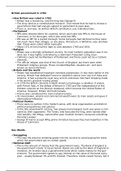British government in 1783
• How Britain was ruled in 1783
• Britain was a monarchy, and the king was George III.
• The king ruled as a constitutional monarch. That meant that he had to choose a
government that had enough support in parliament to pass laws.
• There is, and was, no written British constitution, just individual laws.
• Parliament
• MPs were elected either for counties, which each sent two MPs to the House of
Commons, or for boroughs, which also send two MPs.
• Pitt was an MP for a pocket borough. Some boroughs had declined so they were
not much more than villages, or one place, Old Sarum, in Wiltshire, was uninhab-
ited. These were called rotten boroughs.
• About 11% of men had the right to vote between 1780 and 1831.
• Religion
• Britain was a strongly protestant country. Its main Catholic population was in Ire-
land, but it was tightly controlled by a dominant Protestant ruling class.
• Catholics could not be Members of Parliament and there could not be a Catholic
monarch.
• The official religion was that of the Church of England, but there were other
Protestant religious groups. These included Baptists, Quakers etc. and were
known as nonconformists.
• Britain and the world
• Britain had established important overseas possessions. In key wars earlier in the
century, Britain had defeated France to establish control over much of India and
America. It had a powerful royal navy and its extensive merchant shipping made
it the world’s greatest trading power.
• In 1776 the British colonists in North America had begun a rebellion. It ended,
with French help, in the defeat of Britain in 1783 and the independence of the
thirteen colonies on the Atlantic seaboard, which became the United States of
America. However, Britain still held Canada.
• France was considered the main national enemy.
• Its naval power, empire and commercial wealth were its main assets and gave it
international influence.
• Political Parties
• There were no parties in the modern sense, with local organisations and distinct
political programmes and policies.
• In the late seventeenth century, two groups had emerged. Each was given a nick-
name by their opponents. The Tories, who favoured the king, were named after
Irish bandits; the Whigs, named after poor Scottish farmers, favoured controlling
the king’s power.
• George III had to accept Whig prime ministers because they had majorities in the
House of Commons.
Key Words
• Smuggling
• This was the practice sneaking goods into the country to avoid paying the taxes
which the government put on certain goods.
• National debt
• This is the amount of money that the government owes. The Bank of England is
the government’s bank. It issues bonds. Bonds are sold by the Bank of England to
investors. An investor buys a government bond which raises money for the gov-
ernment. The government agrees to pay interest on the value of the bond every
year - usually between 3% and 6% interest. Therefore, bonds raised money, but it





